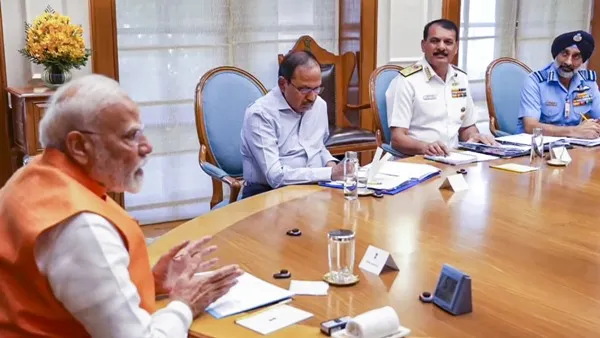KEY POINTS
- Former RAW chief Alok Joshi appointed head of revamped National Security Advisory Board with six new expert members.
- Move follows Pahalgam terror attack that killed 26; CCS discusses cross-border links and security preparedness.
- Government suspends Indus Waters Treaty, gives Armed Forces full operational freedom to respond to terrorism.
In a significant move to bolster national security architecture, the Union government has reconstituted the National Security Advisory Board (NSAB), appointing former Research and Analysis Wing (RAW) chief Alok Joshi as its new chairman. The decision comes against the backdrop of heightened security concerns following the recent terror attack in Pahalgam, Jammu and Kashmir, that claimed 26 lives, including one Nepali national.
Along with Joshi, six other eminent professionals have been inducted into the board. The newly constituted seven-member NSAB features three retired senior military officers: former Western Air Commander Air Marshal P.M. Sinha, former Southern Army Commander Lieutenant General A.K. Singh, and Rear Admiral Monty Khanna. Two retired Indian Police Service officers—Rajiv Ranjan Verma and Manmohan Singh—have also been included, alongside retired Indian Foreign Service officer B. Venkatesh Varma.
This major reshuffle in the NSAB coincides with a series of high-level government meetings focused on national security, held in response to the Pahalgam terrorist attack. On Tuesday, Prime Minister Narendra Modi convened a meeting of the Cabinet Committee on Security (CCS) at his official residence to assess India’s security posture and preparedness in light of the attack.
The CCS meeting, the second since the April 23 briefing on the Pahalgam tragedy, extensively discussed cross-border terror linkages. Officials reiterated that the attack occurred at a time when the Union Territory of Jammu and Kashmir was witnessing a successful democratic process and steady economic development.
In response to the terrorist attack, the government has already announced several decisive measures. Chief among them is the suspension of the Indus Waters Treaty, signalling a stern diplomatic warning to Pakistan for its alleged support of cross-border terrorism.
Apart from the CCS, two other cabinet-level meetings—the Cabinet Committee on Political Affairs (CCPA) and the Cabinet Committee on Economic Affairs (CCEA)—were also held at the Prime Minister’s residence. A formal cabinet briefing was scheduled for 3:00 PM today to apprise the media and public of key decisions.
Earlier, on April 29, Prime Minister Modi chaired a separate security meeting attended by Defence Minister Rajnath Singh, Chief of Defence Staff (CDS) General Anil Chauhan, and the three service chiefs—Army Chief General Upendra Dwivedi, Navy Chief Admiral Dinesh K Tripathi, and Air Chief Marshal Amar Preet Singh.
Government sources revealed that PM Modi expressed full confidence in the Indian Armed Forces and reiterated that they have complete operational freedom to determine the nature, timing, and targets of any response to the Pahalgam attack.

















Comments